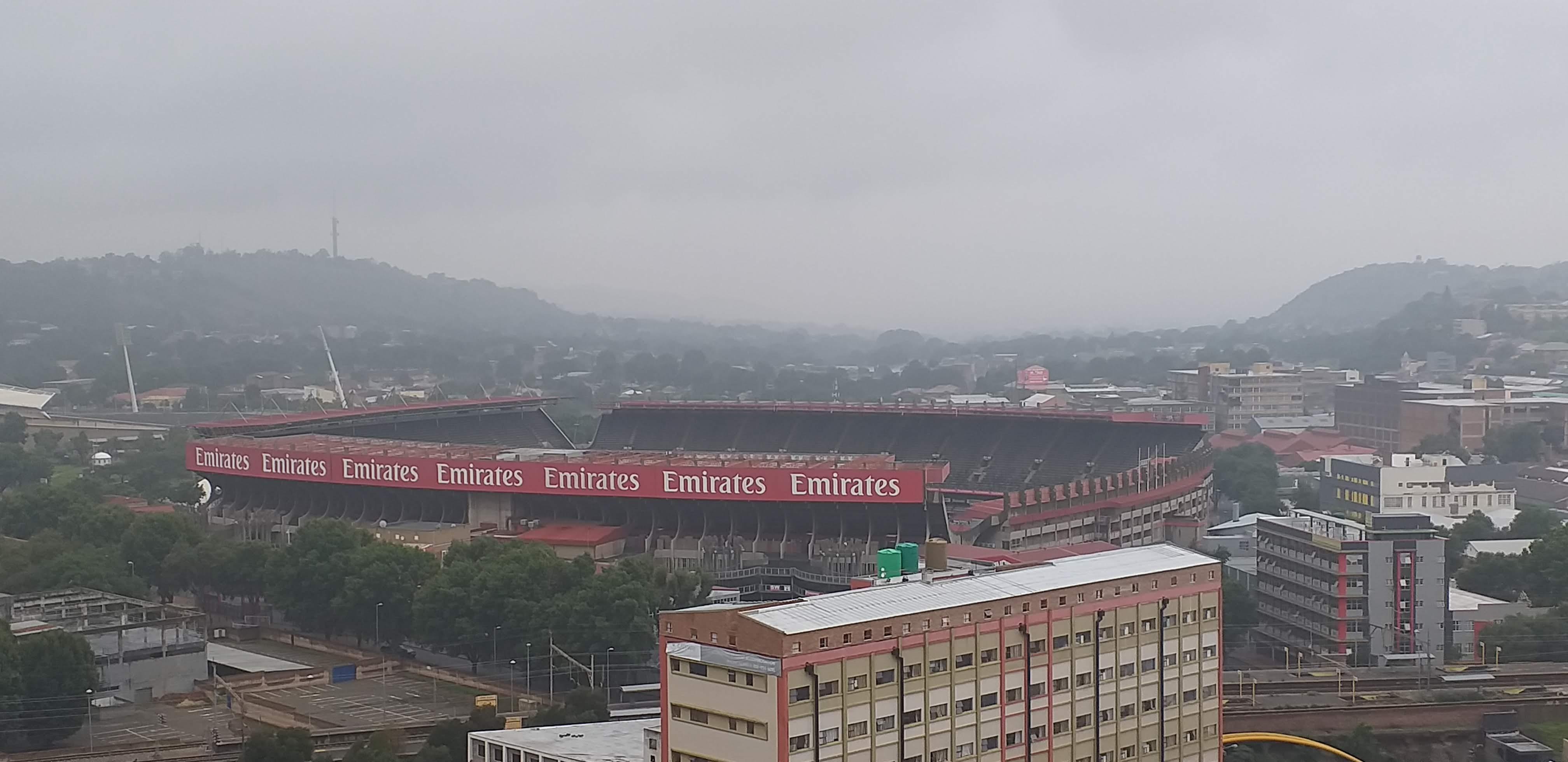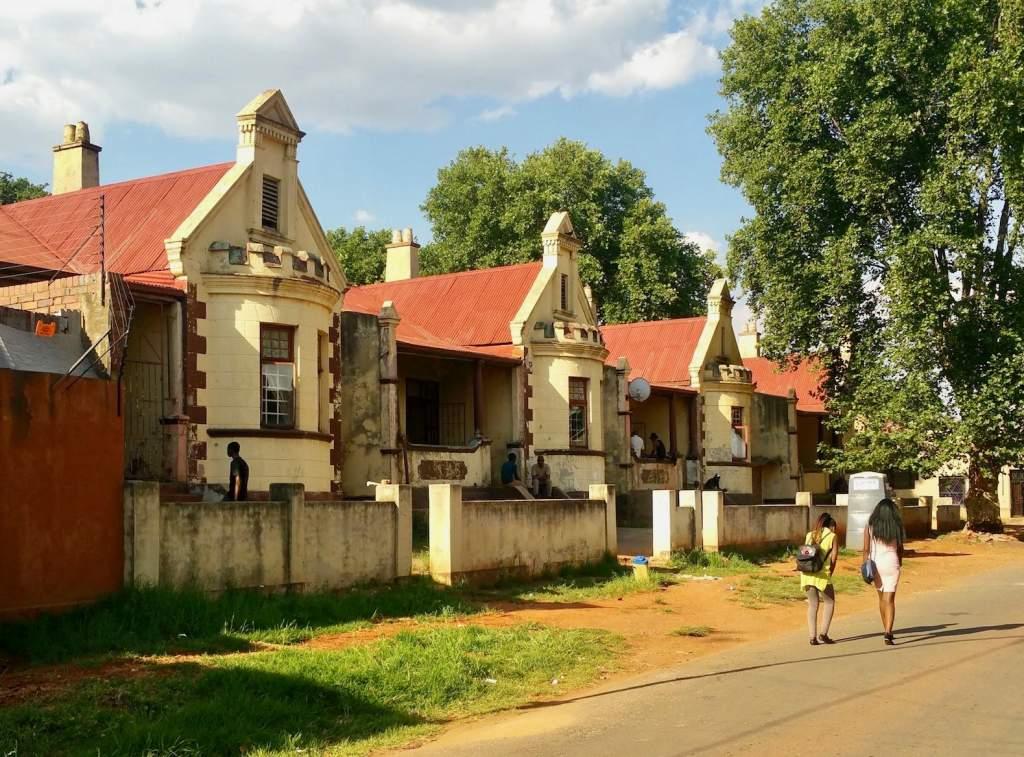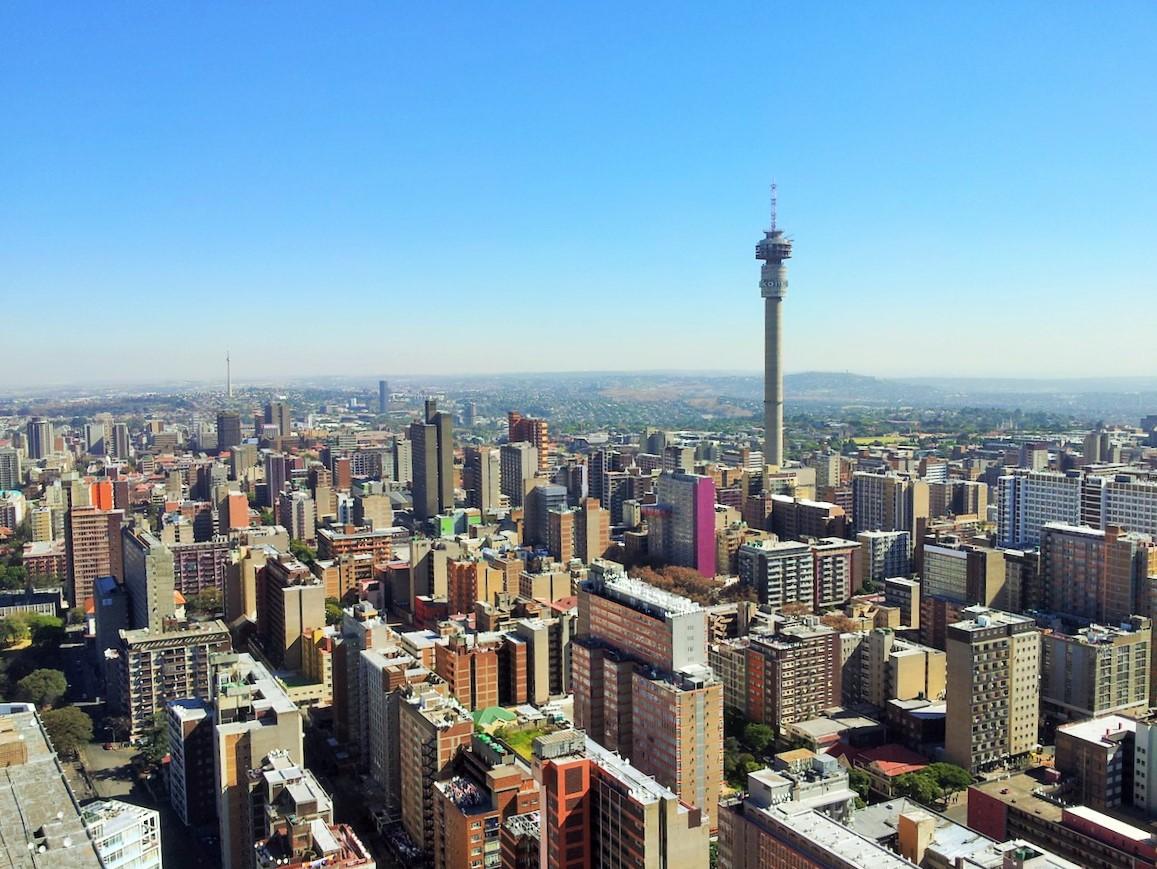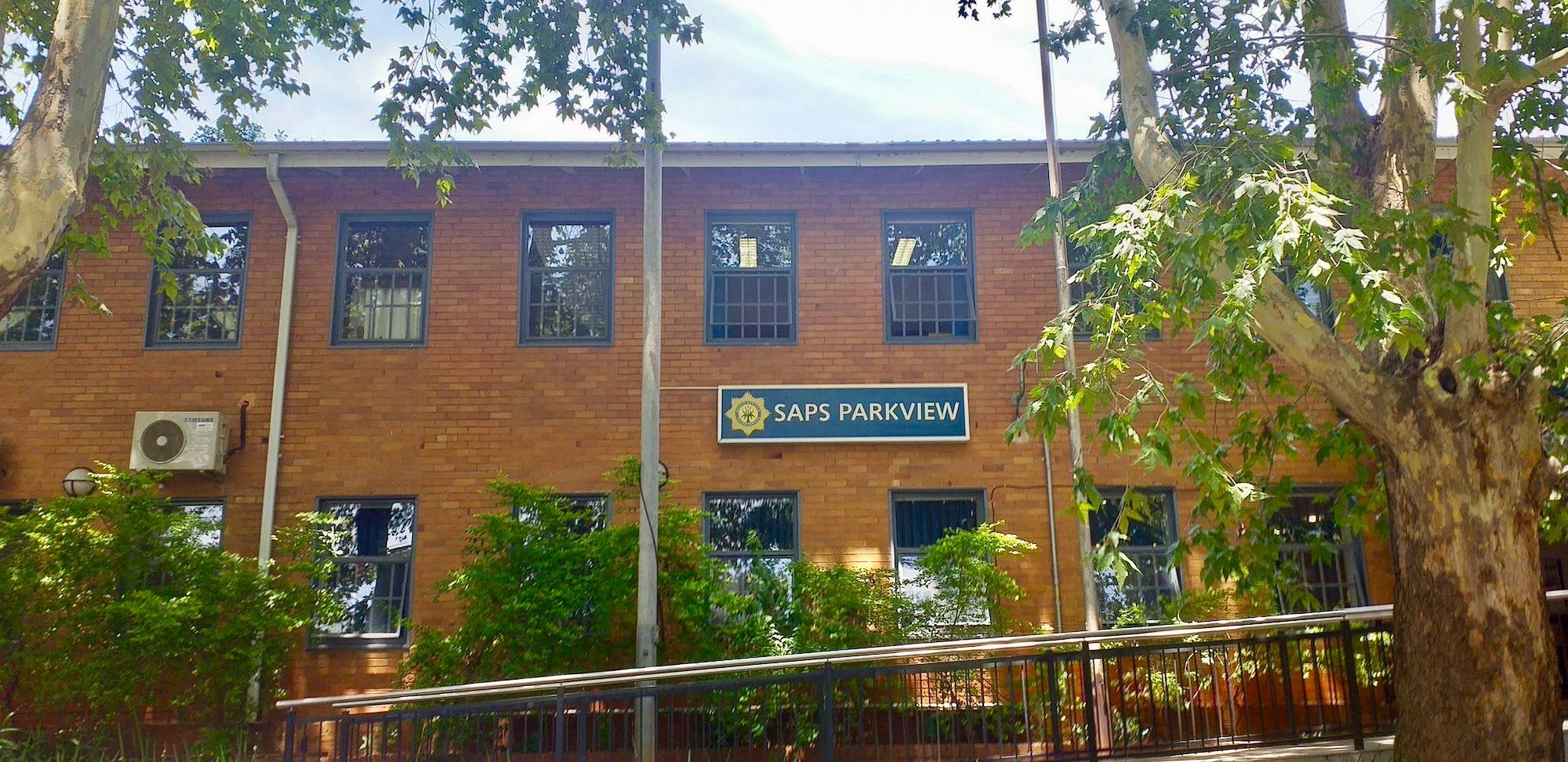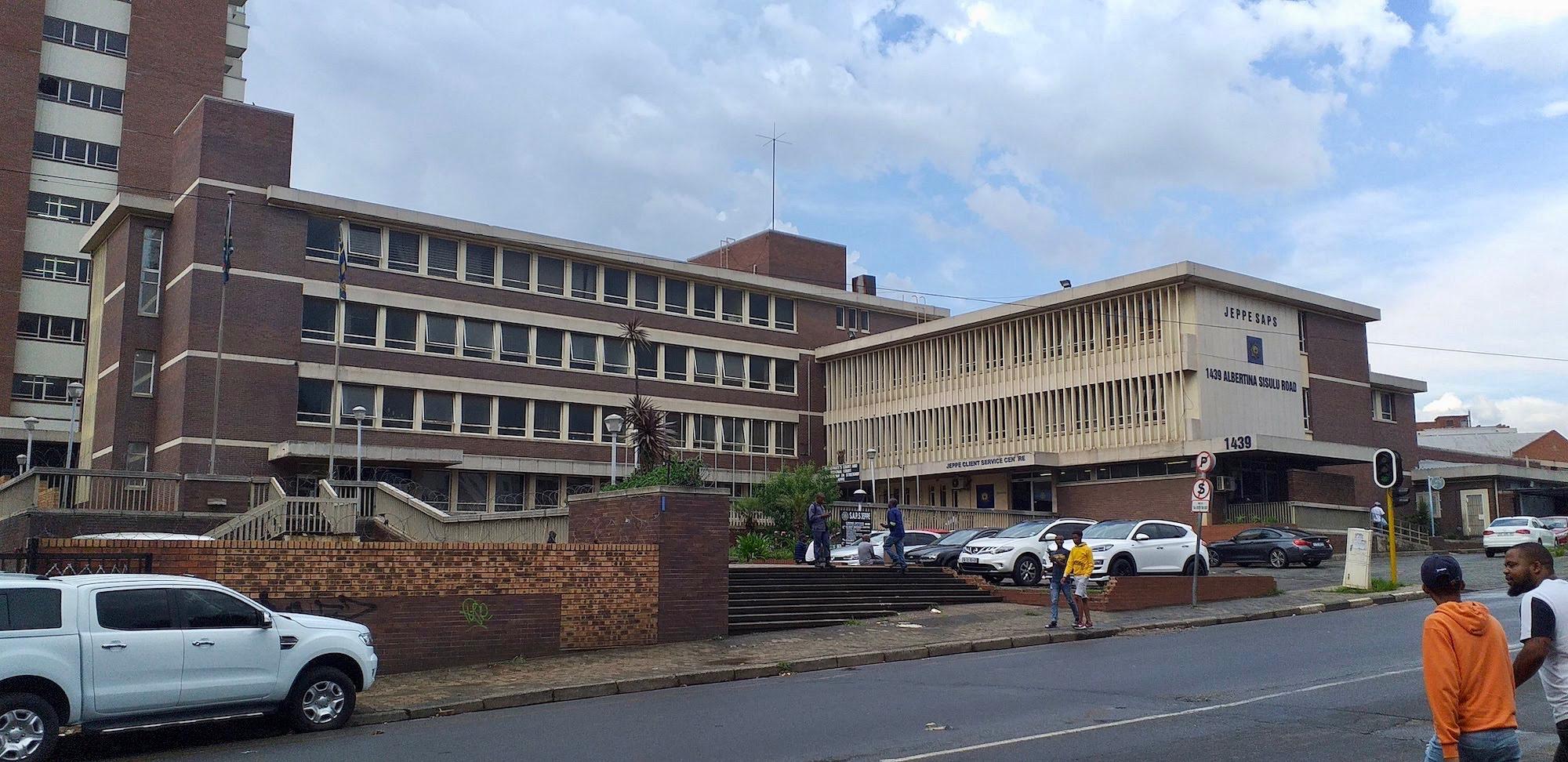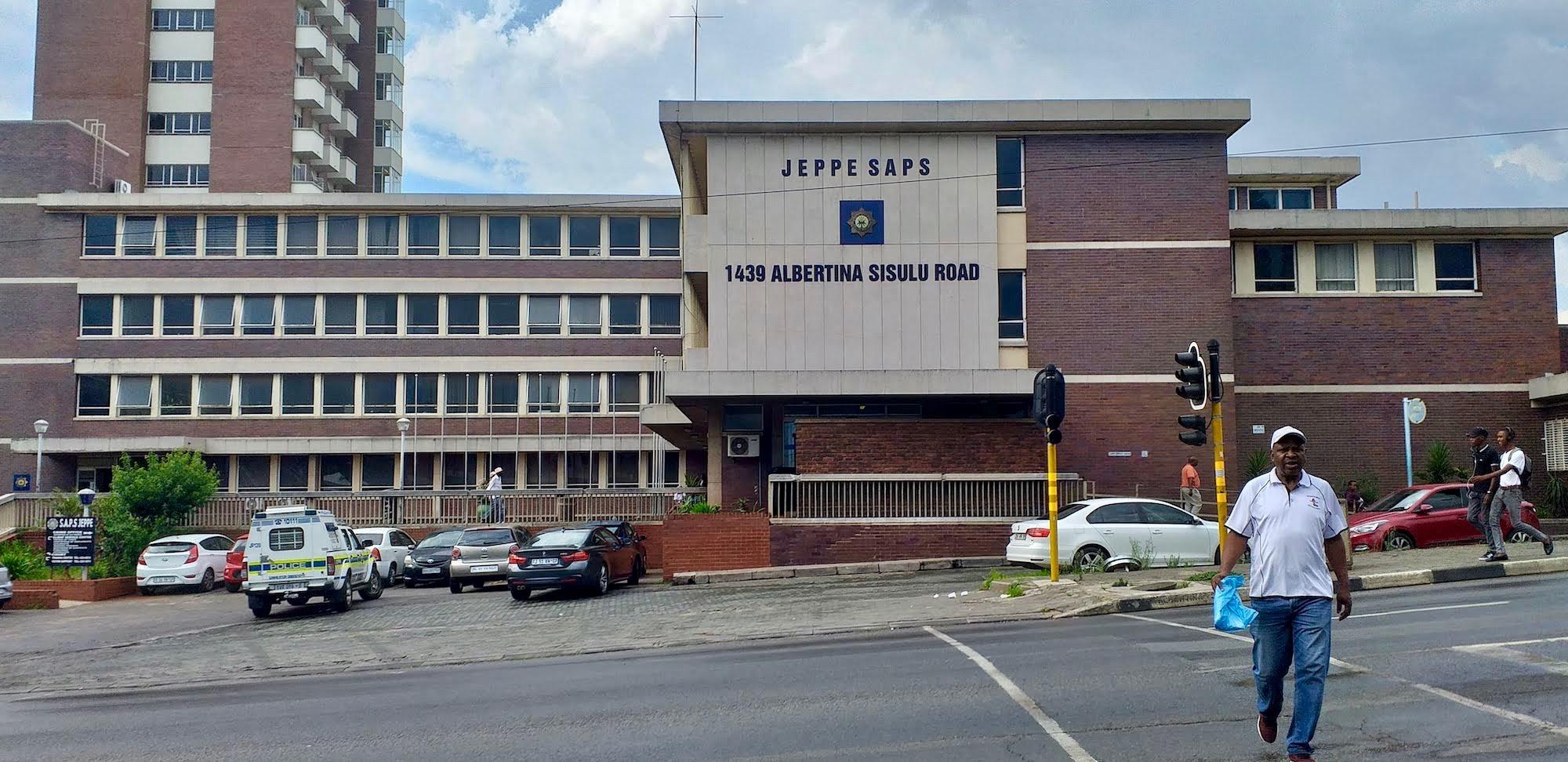
Disclaimer: Any views expressed by individuals and organisations are their own and do not in any way represent the views of The Heritage Portal. If you find any mistakes or historical inaccuracies, please contact the editor.
The article below forms part of Mike Alfred's series on Joburg personalities from the first decade of the 21st century. Click here to view Kathy Munro's fantastic introduction and here to view the series index. The stories were written in 2005/6.
Ronel Bischoff is forty two. She’s small and attractive; looks very good in uniform. She’s married, mother to three teenage daughters, one of them adopted. As Director, with the equivalent rank of brigadier, she has recently taken command of the 222 member, Jeppe Police Station, on the eastern edge of central Joburg. Her ‘government issue’ office features landscape and wild animal pictures. Two teddy bears huddle together on a chair. I assume they’re for kids whose mothers are letting their hair down to the Director. Perhaps they help the children themselves to speak? Jeppe has long been known as one of the tougher urban postings. Its area of jurisdiction encompasses Jeppestown, Ellis Park, Bertrams, Troyeville, Belgravia, Doornfontein and part of Kensington. Diverse, might describe the precinct well. It comprises major sports stadia, several industrial and commercial areas, million rand homes on Langermann Kop, restored old miner’s houses in Troyeville. It presents a complex panorama of early Joburg.
Ellis Park from above (The Heritage Portal)
It’s partly a rough area, full of people desperately trying to better themselves. Illegal immigrants survive by doing anything they can; expediency rules the day, lawful or not. Amidst the mayhem, people struggle to retain their respectability, surviving muggings, burglaries, assaults and rape. Parts of Doornfontein and Bertrams are particularly slum-like, with thousands of ‘shadows’ occupying once fine, now broken down houses long since prevented from drawing water or electricity. The area abounds with drugs and dealers. Rubbish lines the streets. Stemming the flow of illegals is like saying no to the tides. In addition to their normal duties, Jeppe police officers are responsible for crowd control at the big sporting functions. Bischoff must exercise leadership within and also show the concerned face of the police to the public.
Deteriorating historic houses in Bertrams (The Heritage Portal)
Bischoff’s task would appear to be almost superhuman, but she’s very matter of fact about it. She looks one straight in the eye. I gather she doesn’t miss much. She’s the epitome of cool; she puts her head down and gets on with the job, which comprises a complex managerial challenge. Her working life is not to be compared with TV police dramas or a best selling thriller. Much of what she does is routine, allied to a river of paperwork. After all, the South African Police Service is a bureaucracy which functions by using tried and tested procedures. Despite tradition, the Police force is changing and when it comes to change, it seems that Ronel Bischoff and her sisters are playing a significant role. Much of her time at Jeppe is spent attending to aggrieved and frightened citizens who are struggling to come to terms with a harsh urban life. Her own people look to her for direction in a complex, always challenging job. Her door is always open, as I discovered when I first approached her. She’s obviously learnt to recognize and ride side by side with harsh reality. Undoubtedly she’ll give this posting her best shot and try not to suffer too many sleepless nights in the process. The solid citizens and the helpless of her precinct, of whom there are many, achingly wish her to turn Jeppe Police Station into a model of effectiveness.
This is not a romantic tale of high speed car chases or gun battles or brilliant detective work, where the puzzles are neatly and swiftly solved between the advertisements. Rather it is a story, an everyday story of a woman who works within a state bureaucracy charged with protecting citizens. She obviously enjoys the organizational and hierarchical life and has learnt to operate effectively within it. Her promotions suggest that she is highly valued. She handles the challenges faced by all career women, juggling her various commitments in a manner to be admired.
Ronel Bischoff’s ambition was clear from the age of four or five. ‘When I was very small, it was the only thing I wanted to become, a ‘police.’ When we got TV in standard four, I watched the crime programmes and I became even more motivated. On the day I passed matric, I went for an interview and then to the [Police] College for basic training’
Ronel grew up and was educated in Welkom. One of her endearing qualities is that, in a world dominated by fictional exaggeration, she doesn’t strive for effect. ‘When they came from Pretoria to interview us they said I was too short. Luckily they took two twins because they were good athletes and they were short, so I squeezed in with them. I was also a karate black belt; that helped me to be accepted. But I’m one of the lucky ones, so far I haven’t had to use physical force.’
‘My parents were okay about me becoming a policewoman. They thought I’d be posted back to Welkom after College but I was posted to Hillbrow. For me it was so exciting, for them it was a shock, scary, they’d never been to Joburg. I started my police career listening to complaints and opening dockets in the Charge Office [now the Client Service Centre]. In those years, 1983, policewomen were not allowed to work outside. They tried to protect us. We were very unhappy. Then I moved to the accident department. It was so boring. In Hillbrow they reported more than fifty accidents a day. I learnt to hate the telephones. People were either rude or screaming at you for an accident report number. I decided to get out of that office. I started to study for my Higher National Diploma in Police Administration. You take it in three stages; Sergeant, Warrant Officer and Officer. Then I was promoted to Sergeant. They moved me to an enquiries department where we worked with warrants of arrest, subpoenas to appear in court and taking statements. I became the head of that department. At that stage women had to work inside. We all came in for special operations, raids, road blocks, but they kept the women inside. Then, in 1984, they allowed us outside but we always had to go with a man, never another woman, but at least I was able to get out of the office.
Hillbrow from above (The Heritage Portal)
‘I met my husband at Hillbrow. He was also a policeman. On the 31st of March 1984, we were married. I started working outside with him on arrests and investigating complaints. I didn’t wear a side arm, I carried a gun in my bag because in those days our uniforms didn’t have a belt. In those years there were no problems going into those Hillbrow apartment blocks. It got worse later.
‘When we all left the police college, there were about twenty five of us women, and we all wanted to be detectives. It seemed so glamorous. But then, if you grow up in the police, when you gain experience on the job, you realize that maybe this isn’t the way to go. Detectives do an enormous amount of work. They get new dockets [cases] every day. They must arrest people and keep their dockets up to date, take witness statements; they work all hours, they don’t have much time for themselves. So I was faced with a decision: in which direction do I want to go? And I liked my uniform. Working in civvies didn’t appeal to me.
‘I had passed my sergeant’s exams and then I started studying for the warrant officer exams but by that time I was pregnant with my first daughter. Sindy Lee was born in 1985. Then there was another problem. My family was in the Free State so there was no one to look after the baby. And I was working shifts. You can’t work shifts and look after a baby. My husband and I decided that I would leave the force. I decided no one was good enough to look after my baby and I stayed away for two years. One of the problems we experienced then was that my husband, a sergeant, brought home four hundred rand a month and we had just bought a house in Rosettenville. We couldn’t live on that sort of money. We were living on wors and cucumber [laughs] and we decided no, I have to go back to work. That was the first step in my motivation to become an officer. I said we can’t go on like this. If I go back I must write those exams and become an officer. When I was a constable and a sergeant we just enjoyed life but when I returned I wasn’t messing around anymore. Our plan was that with only enough money for one of us to study, I would pass first and then my husband would study for his exams.
‘When I returned I was posted to Parkview Police Station where I was dealing with basic admin matters, sick leave, disciplinary hearings, that sort of thing. Then I passed the warrant officer exam and I became head of enquiries branch. Then my husband and I were moved to a new station in Rosebank. But by then I had passed my National Diploma and I was sent on an officer’s course in Paarl. That was a staff course, concentrating on administration. When I returned I was put in charge of the charge office and the cells at Hillbrow; so I was back where I started.
SAPS Parkview (The Heritage Portal)
‘I think that becoming an officer was my greatest career challenge; studying, writing those exams, working, raising a family. The toughest time was when the kids were in the crèche. There are no police crèches. Often my husband and I worked after hours. So when I was still on duty, I had to fetch them and they would stay with me, some times in the vehicle, until I went off duty. The kids remember coming to work with me during the school holidays. They remember running down the passage on the fifth floor at Hillbrow Police Station, they remember going into the Captain’s office at Parkview.
‘The District Commissioner asked me to handle logistics for the eight stations in the district. From my Hillbrow Office, I spent two years making sure there was enough equipment for everybody: vehicles, bullet proof vests which were new at that time, handcuffs, weapons, ammunition and furniture. The furniture in particular, was very old and we had to replace it. We introduced holsters for females. Police must go out well protected, well equipped. You learn something new about administration every day in a job like that. You learn to handle money, to use it smartly, allocate it well. You learn to set the right priorities.
‘When the district closed down I was given the choice of either going to John Vorster Square to handle logistics or to Cleveland Police Station. I chose Cleveland. That was in 1995 in the New South Africa when police transformation was beginning. I’d been running crime prevention for two or three months when the Station Commissioner was shot on patrol. Because of my rank and experience at that point, I became acting Station Commissioner. Unfortunately he never came back, he was too badly injured, so I remained acting in the job.
‘Cleveland was a very nice station but then, a member of the public was shot in the Client Service Centre by a policeman. There was a huge outcry in the press and people were too scared to come to the Centre anymore. Our policemen were sworn at and abused. So, working together with the Community Police Forum we battled to regain the trust of the community. We concentrated on crime prevention, crime dropped, and we became one of the best stations. Unfortunately the harmony did not last. South Africa at that time was changing radically.
‘My period as acting Commissioner at Cleveland was perhaps when I learnt the most. I found myself managing a situation of changing race relations. The situation was not as harmonious as before. All of us, we all had to learn new approaches. I often became impatient. My reputation occasionally suffered in the local press. During that period, I personally faced many important managerial issues. For instance, what is the best way of exerting authority and discipline in a confrontation situation? Do I need to change my managerial style? How do we, all of us keep serving the public while we deal with the internal stresses? Should I be managing communications in a different way? How do I negotiate with the members of the Police Union [Popcru]?
I realized during my duties at Cleveland that leadership in the Police Force would never be the same; my own approach would never be the same. It was a tough and lonely time but I came out of it a better manager, a better communicator. That was my experience in the new South Africa. I wasn’t alone; it was happening in police stations all over. It was a period of serious self assessment. I began questioning my attitudes and tolerance. I have no doubt that struggling and dealing with the union made me a better manager.
‘So, when I was promoted as Senior Superintendent to Bramley Police Station, I spent more time consulting with members. My attitude to the Union was more accepting. We discussed and solved problems together. I realized that the days of asking people to blindly follow instructions were over. Today it’s a major difference in the Police Force, we’re far less authoritarian.
‘Bramley was one of the best stations I ever served at. We all worked together. It didn’t matter whether you were a detective or a uniformed guy, we fought crime together. I didn’t just sit in my office, I worked with them, inside and outside, special duties, every thing. To manage a police station well, you must lead from the front. While there I applied three times for a Director’s post. I was turned down twice. Third time, I was lucky, I was appointed to Jeppe and I’ve been here six months.
‘The image of Jeppe has suffered recently. I make sure that if there is any complaint against the police we deal with it quickly and we deal with it correctly. We see the complainant and we make sure we sort out the problem. My people can walk into my office and they can get decisions from me. I’m not scared to talk about corruption. I tell them, if you’re corrupt we’ll arrest you, if you don’t turn up for work we’ll conduct a departmental investigation. We’ll get rid of you; if you don’t want to work you don’t belong here.
Jeppe SAPS (The Heritage Portal)
Inevitably we get on to the subject of Director Bischoff the woman boss. The American TV shows largely depict women police officers as having a tough time at the hands of their male colleagues. She has this to say; ‘You know what, I have no problem with being a female Station Commissioner. I believe that if you treat me well, I will treat you well. We will work together but I won’t be your friend, we’ll be co workers and the line will be drawn. I’ve never experienced a problem with male policemen. The day I was appointed here at Jeppe I received phone calls from many men: Don’t you worry Director, we will support you. Men know we’ll be promoted on merit. The women cops here are accepted as equals. They work outside with men as partners and they look after each other. We all, men and women, work flexi-time when we concentrate on crime prevention. We might start at three in the morning and knock off at eleven. And, as Station Commander, I work with them. If you want their respect you must work with the members.
‘Women bring sensitivity to the police and another way of thinking. Women will listen to a complainant while a man might be impatient. Most women will go the extra mile. They’ll take a victim to hospital; they’ll keep contact afterwards. The womanly qualities of support are bringing about changes. Here at Jeppe I’m pleased to say the members are happy, they enjoy their work, they’re not always grumpy like it used to be. Men have their own problems and every day they must deal with police problems. It helps when they can talk. I listen, I think women are better listeners, and most of the time I don’t even give advice. Men appreciate that someone is prepared to listen.’
Other changes are happening in the police. Ronel Bischoff, together with other station commissioners, is receiving the sort of training that causes her to say ‘it’s like being at a modern business school.’ And she faces the great challenge of applying the new learning back on the job. ‘Instead of following old police procedures I try to change my approach. And people are looking for change. They know that policing in other countries is different. But they’ll still question me, they’ll ask, “why must we do it this new way?” But I can teach them that there are many and better ways of doing police work. Things are changing. Drinking in the canteen after work, that culture is also dying. It’s one of the best things that could happen!
‘Am I a senior executive or a crime fighter? When I leave here for a meeting with the District Commissioner, I’m a senior executive, here at the station it’s more fighting crime. It’s both, but I’ve learnt that when a station spends too much time on admin, crime goes up. So we try to streamline the admin so we can spend more time fighting crime. At this moment for instance, our crime is up so I’m spending much more time out of the office. If we can’t turn it around we’ll start shifts. We won’t concentrate on more arrests, we’ll concentrate on priority crimes; housebreaking, hijacking, assault. We’ll be more visible on the streets.
‘My career has moved well. My greatest ambition was to become a brigadier and I’ve achieved that, so now I’ll work to become a commissioner. How does my husband feel? My husband is no longer in the police. He’s my greatest supporter. He knows the police, so I can discuss problems with him. He gives me advice, sometimes I don’t take it, but mostly I learn a lot from discussing problems with him; he’s like a mentor to me. He understands the job. He knows that if I tell him I must work overtime that’s it. He accepts it. My daughters are proud of me. They don’t want to become policewomen, but they do want successful careers like ma. My youngest daughter wants to become the boss. [laughs]
‘My husband and I and our three daughters live on a smallholding at Allewynspoort near Eikenhof. It’s beautiful there, you wouldn’t believe it’s only ten kms from the city. Living out in the country really helps me through difficult times. We go walking. When I want peace and quiet, I work in the garden. When I go home I forget about my troubles.’
About the author: Mike has spent most of his life in Johannesburg. He earned his living as a human resources practitioner, first in large companies as a manager, [many stimulating years with AECI] and later in his own small HR consultancy. Much of his later occupational time was spent running training courses for managers on how to handle staff within the framework of South African labour legislation, He wrote and published The Manpower Brief, an IR, HR and sociopolitical newsletter, which was popular in many large companies during the 80s and early 90s. A selection of Briefs were incorporated into the book, People Really Matter published by Knowledge Resources. While working, he wrote several business books, one of which, on negotiating, was a sell-out.
In his ‘retirement,’ he has written extensively about Johannesburg, publishing articles mainly in The Star and Sunday Times. Working with Beryl Porter of Walk & Talk Tours, he developed and guided many walking tours around historic Joburg – Braamfontein, Parktown, Newtown, Centre City, Constitution Hill, Kensington & Troyeville, Fordsburg etc. He regularly took visitors to Soweto. His book Johannesburg Portraits – from Lionel Phillips to Sibongile Khumalo, offered popular biographical essays of well known Joburg citizens. His researched paper on Judge FET Krause who surrendered Johannesburg to Field Marshall Roberts during the Anglo-Boer War, was published in the Johannesburg Heritage Journal. The same journal published his series on famous local paleoanthropologists.
Mike is also a widely published poet. Botsotso recently published his third book of poetry, Poetic Licence. His current historical work, published by co-author Peter Delmar of the Parkview Press, The Johannesburg Explorer Book, takes readers on a journey through old Johannesburg, weaving together a history of events and people, which make this city such a fascinating place. His most recent book, a work of journalism, Twelve plus One, featuring transcribed interviews with Johannesburg poets was issued in 2014.
He lived with his wife Cecily, in a century old, renovated house on Langermann Kop, Kensington. A widower since July 2014, he now lives in Eventide Retirement Village in Muizenberg. He believes himself very fortunate in that his son, daughter in law and grandsons live nearby. His daughter lives in Sydney with her husband and son. In case you’re wondering, Luke Alfred, Mike’s son, is the well-known journalist and author.
Comments will load below. If for any reason none appear click here for some troubleshooting tips. If you would like to post a comment and need instructions click here.

